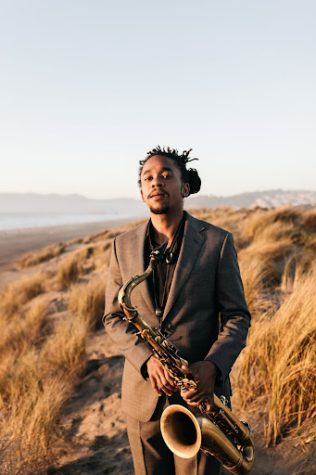Kazemde George Brings Jazz, Discussion to Campus

Photo courtesy of Ben Warren ’25.
Kazemde George and his jazz trio paired a lively performance this weekend with a discussion of Black American Music and the African diaspora. George, who plays the saxophone, along with drummer Kayvon Gordon and bassist Dean Torrey, led a discussion of the African roots of jazz and other American musical traditions before treating a Dickinson audience to original music in the Rubendall Recital Hall.
George says, “We can use music as a way to understand that history that wasn’t written down.” He and his trio see a distinct cultural lineage that connects West African traditions to the Cuban güíro sound to American jazz and rap music.
During Friday’s workshop, the three musicians touched on musical themes that crossed disciplinary lines from history and anthropology to mathematics. They see music as a way to understand how people interact and move throughout history. George says, “you have to be open-minded at some level,” in order to see these connections across space and time.
This unique cultural lineage, says Torrey, is distinct from European music traditions. He says, “It’s very human. In European or Old-World traditions, you don’t see that.” The group sees that humanness as essential to the understanding of jazz and its complex melodic phrases. George compares the harmonies and melodies of that genre to a conversation, calling and responding between musicians. He says, “There’s an element of African music that is inherently community-based.”

When members of the West African communities that originated those traditions were enslaved and forcibly brought to the Americas, they adapted the music to their new environment. In a process that George calls “syncretism,” West African traditions were funneled into music and equated with Christian figures. Gordon demonstrated the “drum call” of a deity called Elegua, who was later equated with Saint Michael or Saint Anthony, a complex rhythm full of syncopation that he says would have “instantly recognizable” to those familiar with the god.
It was this mixture of cultures, West African, European, Caribbean, from which jazz was born in the United States. Though George admits that “it’s really hard to trace rhythm,” he identified similar melodic phrases that appeared in each tradition. The similarities can be difficult to hear, George says, because what a West African musician might play on a drum, a jazz musician might play with a trumpet or a saxophone, and a Cuban musician might play on a clave. Nevertheless, parallels exist.
George’s unique educational background leads him to connect ideas that most people do not see. He graduated jointly from Harvard University and the New England Conservatory, with degrees in neurobiology and jazz composition. He says, “I always want to get into the nitty-gritty…I like to analyze things and break them down to the fundamental levels.” He gives his ventures into Brazilian music as an example: “I’ve been learning the same 10 songs for the last 10 years,” noting that his background in biology helps to push an intense focus on whatever he is studying at a given time.
Whether between biology and music or West Africa and the United States, George, Gordon, and Torrey prodded deep connections across space, time, and discipline. But, as George says, “As much as I believe in all the lofty thinking, I really believe in picking one thing to be really good at.” When asked if he had any advice for aspiring musicians looking for inspiration in the African diaspora, he said, “Educate yourself to the history of people of color.”
Kazemde George released his debut album “I Insist” this year. CDs can be found here. It can be streamed on most music services.




